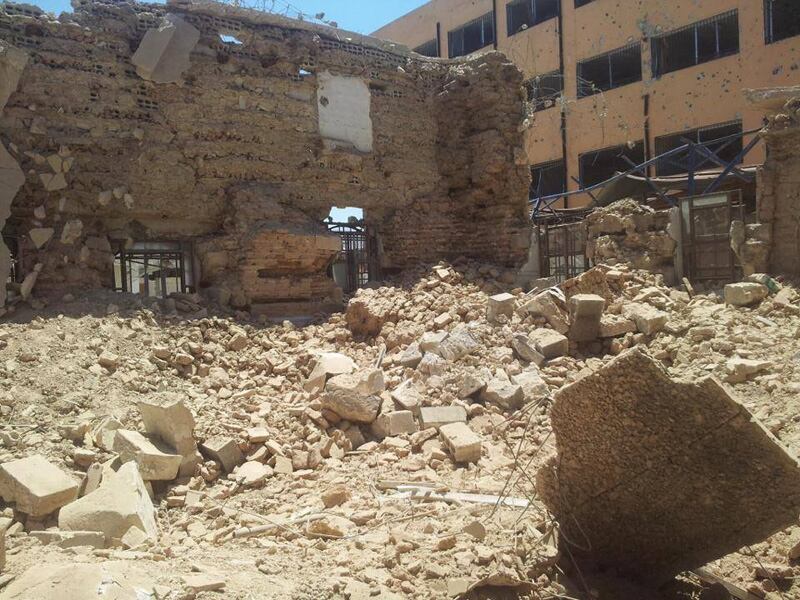Syrian Arab Army forces flattened the Eliyahu Hanabi Synagogue in the Jobar neighborhood of Damascus over the weekend. The attack not only wrecked a site that’s at least 400 years old. It may have destroyed thousands of irreplaceable Jewish artifacts contained inside the synagogue, according to opposition leaders and photos obtained at the site.

The area where the synagogue once stood has been under bombardment by the forces of Syrian President Bashar al-Assad for months. The Syrian regime is laying siege to the town, one of the few rebel strongholds in the area. It’s all part of what the opposition calls Assad’s “scorched earth” policy, which includes random and violent attacks on civilian populations.
“I am deeply saddened to learn of the destruction of Jobar Synagogue, which was a treasure of Jewish and Syrian cultural heritage,” said Shlomo Bolts, an official at the Syrian American Council, an American charity connected to the Syrian opposition.

Bolts, a Jew of Syrian ancestry, said that the Syrian Jewish community is only the latest victim of Assad’s strategy to target religious and cultural institutions.
“Yet this is hardly the only place of worship to be destroyed by the Assad regime. The Umm al-Zinar Church [a house of worship in Homs that locals say dates back to the first centuries of Christianity], the [1,400 year-old] Khalid Ibn Walid Mosque, and countless other irreplaceable cultural sites are now lost to history due to a dictator’s manic desire to keep power at all costs,” he said.

The Syrian American Council is part of the Coalition for a Democratic Syria, an umbrella organization that says it represents over 100,000 Syrian-Americans. The group’s contacts inside Syria shot photos of the rubble where the Jobar Synagogue stood until days ago. Those photos were provided to The Daily Beast.
This week’s attack, though the final blow, was not the first time the Syrian regime had bombarded the Jobar Synagogue. An Israeli news report from April 2013 noted that the synagogue had been “looted and destroyed,” although later photos proved that the synagogue had taken only moderate damage from a mortar shell.
Last December, photos emerged in another Israeli news report showing that many of the synagogue’s most precious artifacts were intact. The report stated that the bulk of the synagogue’s artifact collection was being held safely in the hands of local leaders.
Before the conflict, the synagogue held thousands of religious and cultural treasures, including hundreds-years-old Torah scrolls, historical texts, precious dining ware, and ancient Judaica of all sorts. Some of the items were reportedly looted in the early days of the war. Some were reportedly placed in safekeeping. Many remained in the building until its destruction.

Opposition sources told The Daily Beast that the damage assessment following this week’s devastating attack on the Jobar synagogue was ongoing but all of the Jewish heritage items that remained inside the synagogue are feared lost.
The Eliyahu Hanabi Synagogue, built to honor the prophet Elijah, had existed at least since medieval times. The site has been a destination for Jewish pilgrimage for centuries. It was said to have been built atop the cave where Elijah hid from his persecutors. The Prophet Elisha, who allegedly built the synagogue, was said to have anointed King Hazael on its steps, now gone.
The town of Jobar was home to a significant Jewish population throughout the medieval period, although the community was eventually driven out of Syria and the synagogue was taken over in the 19th century by local Arab leaders. Following the establishment of the State of Israel, the synagogue was used as a school for displaced Palestinians.
Activists estimate that at least 33 churches and hundreds of mosques have been destroyed by the Assad regime since the start of the Syrian civil war. Six UNESCO World Heritage Sites in Syria have been destroyed in Syria since the fighting began.
As early as March 2012, UNESCO Director General Irina Bokova was publicly warning about damage to precious sites and calling on both sides to protect Syria’s cultural legacy.
“Damage to the heritage of the country is damage to the soul of its people and its identity,” she said.






